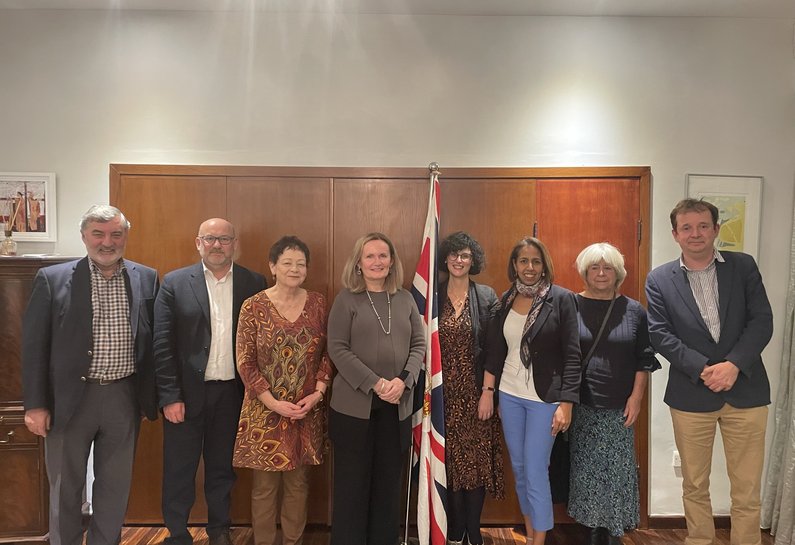Liberal Democrat parliamentarians witness threats to Palestinian health and dignity up close

The delegation comprised Layla Moran MP, Munira Wilson MP, Baroness Barbara Janke, and Baroness Sarah Ludford. Their four-day visit began with a briefing from Lynn Hastings, the UN Humanitarian Coordinator, where they heard about the current dire humanitarian situation in the occupied Palestinian territory, including as a result of increasing levels of Israeli setter violence and military incursions in Palestinian towns and cities. The delegates also met with British Consul General in Jerusalem, Diane Corner, for an update on the political context and to understand the UK’s current diplomatic priorities.
On day two, the delegation visited Al Makassed Hospital in occupied East Jerusalem. At the hospital’s neonatal intensive care ward, they heard from department head Dr Hatem Khamash about the impact of Israel’s restrictive permit regime on newborn babies. Mothers from Gaza and the West Bank whose newborns need the specialist care only available at this hospital must obtain a permit from the Israeli authorities to travel to East Jerusalem. Once the permit expires, mothers, especially from Gaza, are frequently forced to return home and leave their babies alone in the neonatal unit. When their babies are ready to be discharged, families must once again apply for a permit to be reunited with their babies and return home together, and often face delays in doing so. Such separations have a devastating effect on the wellbeing of parents, while depriving infants of the essential contact and care of their mothers in the first days of life.
Dr Hatem also explained the impact of the permit regime on trainee doctors and fellows from Gaza who seek to train at the neonatal unit: “Of the 30 to 40 permit applications submitted for the fellowship programme, only three or four are successful.”
The delegation also toured East Jerusalem with Khalil from Grassroots Al-Quds, a community organisation that supports Palestinian sumoud (steadfastness) and builds networks for Palestinian communities to overcome fragmentation. Khalil explained how Israel imposes the status of “permanent residency” on the more than 358,000 Palestinian Jerusalemites, essentially rendering them stateless in their own land, while more than 225,000 Israeli settlers live in East Jerusalem with full citizenship and access to all the benefits and securities it affords. Khalil also described how Israel’s separation wall has torn apart Palestinian families and communities, and cut Palestinians from elsewhere in the West Bank off from a key centre of Palestinian cultural, social and commercial life.
In the afternoon, the parliamentarians met with Addameer, one of the six Palestinian human rights organisations whose designation as a terrorist organisation by the Israeli government last year has been met with widespread international condemnation and opposition, including from the UK government. The group discussed Israel’s efforts to close Palestinian civil society space, especially for organisations pushing for accountability for Israel’s human rights violations.
The third day began with a visit to the military courts at Ofer prison, where the delegation spoke with the families of detained Palestinians and watched shackled Palestinian youth undergo their trials. The stark statistics provided by Military Court Watch speak for themselves: the courts have a conviction rate of 99%, children as young as 12 can be brought before them, and approximately 800-1,000 Palestinian children are detained by Israel every year. Afterwards, the group met with Defense for Children International-Palestine (DCI-P), who shared horrific stories of how Palestinian children are arrested by Israeli forces and put in isolation and interrogation rooms, prevented from seeing a parent or lawyer.
On the final day, at Dheisheh refugee camp near Bethlehem, the delegation met with community representatives and heard about the issues they face, including near-weekly military raids by Israeli forces. The delegation then continued southwards to visit the South Hebron Hills with human rights organisation Al Haq. There they learnt about the recent demolition of a Palestinian primary school in Masafer Yatta, where residents are facing the ongoing threat of forced displacement. The school was built about a month before the demolition and had been operating for less than two weeks. It served 22 students from four different villages in the surrounding area.
In the southern city of Hebron, the group witnessed the impact of intense movement restrictions and Israel’s heavy military presence on the city’s Palestinian population. Hebron’s former commercial heart, Shuhada Street, is now a ghost town, with Palestinians prohibited from access and hundreds of shops now closed down.
Throughout the week, the delegation also met with representatives of the Palestinian Authority and Palestinian, Israeli and international civil society organisations. MAP extends our deepest thanks to all of those who took the time to meet the group, to talk about their lives, and help us all to better understand the impact of the occupation on the health, dignity and wellbeing of the people who endure it. We also thank the delegates for taking the time to visit and hear the voices and perspectives of the communities MAP serves in the West Bank.
MAP and Caabu regularly take delegations of parliamentarians from all parties to the West Bank. You can read about our last delegation, with a group of Labour MPs, here.
Photo: Parliamentarians meet with the British Consul General in Jerusalem.
Related content

